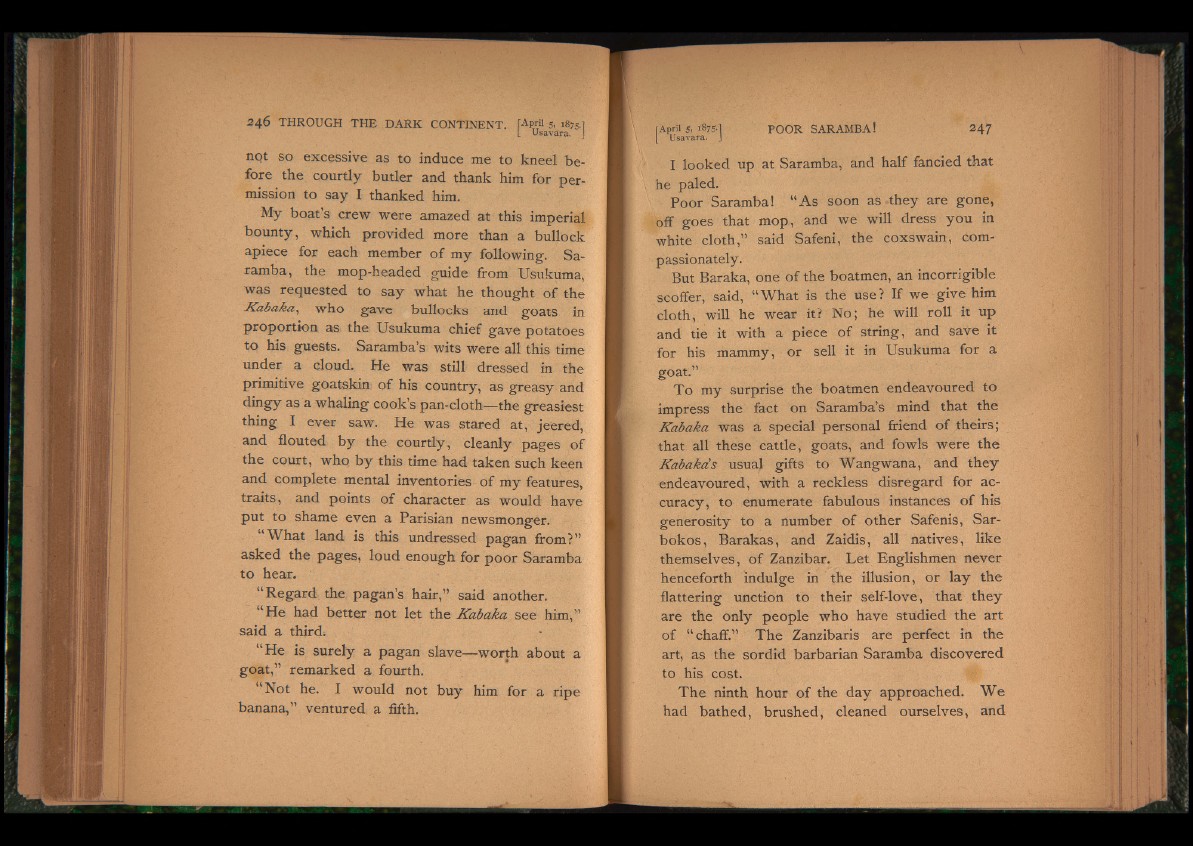
not so excessive as to induce me to kneel before
the courtly butler and thank him for permission
to sa y I thanked him.
My boat’s crew were amazed at this imperial
bounty, which provided more than a bullock
apiece for each member o f my following. Sa-
ramba, the mop-headed guide from Usukuma,
was requested to sa y what he thought o f the
Kabaka, who gave bullocks and goats in
proportion as the Usukuma chief gave potatoes
to his guests. Saramba’s wits were all this time
under a cloud. He was still dressed in the
primitive goatskin o f his country, as greasy and
dingy as a whaling co ok’s pan-cloth——the greasiest
thing I ever saw. He was stared at, jeered,
and flouted b y the courtly, cleanly pages o f
the court, who b y this time had taken such keen
and complete mental inventories o f my features,
traits, and points o f character as would have
put to shame even a Parisian newsmonger.
“What land is this undressed pagan from?”
asked the pages, loud enough for poor Saramba
to hear.
“ Regard the pagan’s hair,” said another.
“ He had better not let the Kabaka see him,”
said a third,
“ He is surely a pagan slave— worth about a
go a t,” remarked a fourth.
“ Not he. I would not buy him for a ripe
banana,” ventured a fifth.
I looked up at Saramba, and half fancied that
he paled.
Poor Saramba! “ A s soon as »they are gone,
off goes that mop, and we will dress yo u in
white cloth,” said Safeni, the coxswain, compassionately.
But Baraka, one o f the boatmen, an incorrigible
scoffer, said, “What is the use? If we g iv e him
cloth, will he wear it? No; he will roll it up
and tie it with a piece o f string, and save it
for his mammy, or sell it in Usukuma for a
goat.”
T o my surprise the boatmen endeavoured to
impress the fact on Saramba’s mind that the
Kabaka was a special personal friend o f theirs;
that all these cattle, goats, and fowls were the
Kabakds usual gifts to Wangwana, and th ey
endeavoured, with a reckless disregard for accuracy,
to enumerate fabulous instances o f his
generosity to a number o f other Safenis, Sar-
b o k o s, Barakas, and Zaidis, all natives, like
themselves, o f Zanzibar. L e t Englishmen never
henceforth indulge in the illusion, or la y the
flattering unction to their self-love, that th ey
are the only people who have studied the art
o f “ chaff.” T h e Zanzibaris are perfect in the
art, as the sordid barbarian Saramba discovered
to his cost.
T h e ninth hour o f the d ay approached. W e
had bathed, brushed, cleaned ourselves, and